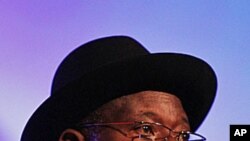In Nigeria, a presidential committee on terrorist attacks says the government should consider offering an amnesty to Islamist militants in the north similar to an amnesty ended separate violence in the oil-rich south.
Former militants in the Niger Delta swear allegiance to the federal government at the close of a retraining program that ended years of violence in the south.
Sabotage and attacks by the Movement for the Emancipation of the Niger Delta cut Nigerian oil production by one-quarter in 2008. The government of then-president Umaru Musa Yar'Adua negotiated an amnesty for fighters who turned in their weapons and joined camps where they were given a stipend and job training.
Instrumental in that deal was Yar'Adua's vice president, Goodluck Jonathan, who is from the Niger Delta. The amnesty's success was central to this year's presidential campaign by Jonathan, who now faces his administration's biggest security challenge: Islamist militants from Boko Haram.
Security officials say the group is responsible for coordinated attacks on police stations, churches and an army base in small towns across northern Nigeria, earlier this month, that killed more than 100 people.
Boko Haram says it is fighting for the establishment of a separate Sharia-led nation in northern Nigeria and recognizes neither the constitution nor President Jonathan's election.
The president named a committee to consider opening talks with the group. Among its recommendations is an amnesty for Boko Haram militants who renounce violence and give up their guns.
Borno State Senator Mohammed Ali Ndume was on that committee. “We made some far-reaching and strong recommendations which we feel, if implemented, will go a long way to solving the problem.," he said. "Throughout our committee work and our interaction with various stakeholders we discovered, one, that dialogue in this case is very necessary.”
So how might a Niger-Delta-style amnesty work for Boko Haram?
Niger Delta attorney Ignatius Onwuemele says the situations are entirely different. “Boko Haram is quite different because they are an amorphous group. They are faceless. Who are you going to discuss with? Because in terms of Niger Delta militants, the government was able to negotiate with a group, at least an identifiable group. But these ones you can't identify them,” he stated.
Edward Oforomeh is a retired police officer in the Delta State city of Warri. He says granting amnesty to Boko Haram would be far more complicated than the Niger Delta because one of Boko Haram's principles is a rejection of Western education.
“A person who does not believe in Western education, if you want to grant him amnesty, what do you give him? Are you going to build more mosques for him? How do you train him?” Oforomeh asked.
Niger Delta militants fought for greater investment and environmental responsibility in the oil producing region. Oforomeh says most Nigerians do not know what Boko Haram wants. “They should come out, dialogue with them, discuss with them because everybody is now living in fear. Everyone is living in fear. You don't know who is next. Dialogue with them so that we know their demands and see if they will be able to meet those demands,” he noted.
Attorney Onwuemele says the desperation of Niger Delta militants and Boko Haram fighters are both driven by underlying social weakness in Nigeria that cannot be solved by amnesties alone. "The whole things is a fallout of the societal foibles of unemployment, corruption, the infrastructural decay. We have to checkmate [overcome] this issue of unemployment," he said. "And this issue of decay of our educational system, the decay in the health sector.”
President Jonathan says Nigeria's character is being tested by Boko Haram's “unnecessary killing and destruction.” Moving away from recommendations of an amnesty and dialogue with the group, the president says Nigeria's military is taking a “rapid and robust” approach to “fight and defeat that evil.”
Does Nigeria Need Niger-Delta Style Amnesty for Boko Haram?















